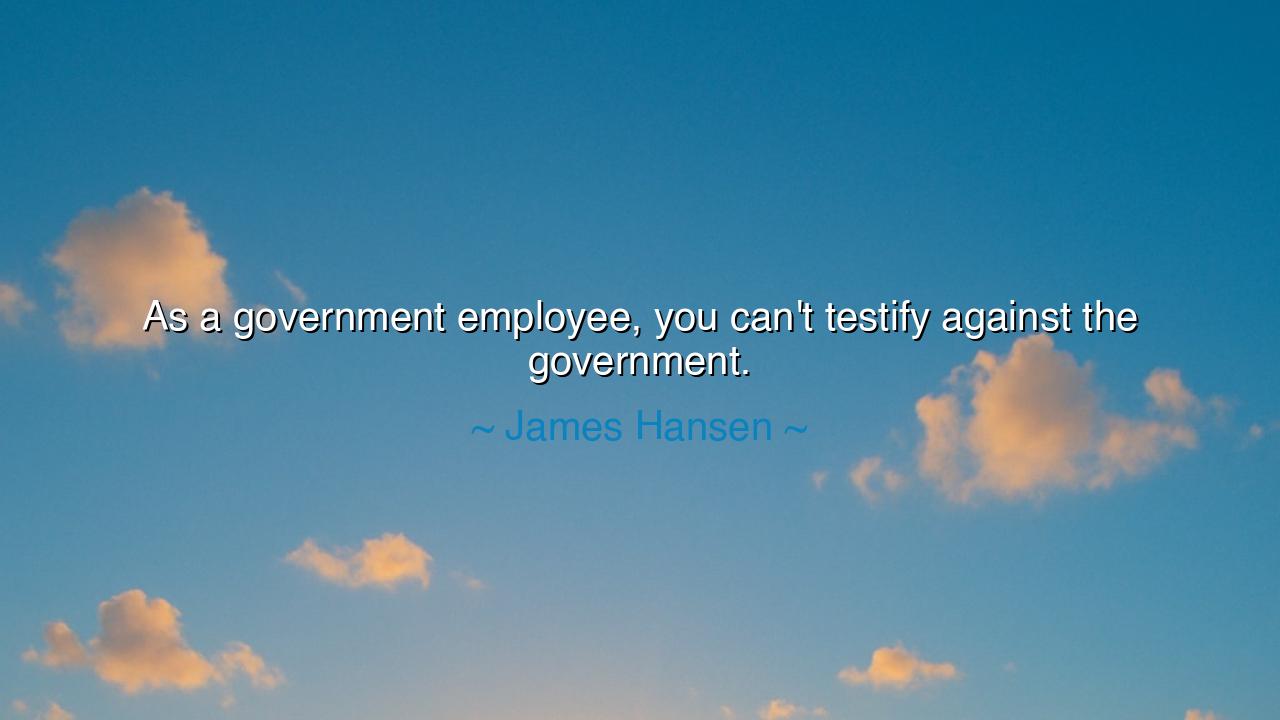
As a government employee, you can't testify against the






When James Hansen declared, “As a government employee, you can't testify against the government,” his words carried not only the weight of his personal struggle but the gravity of an eternal truth — that truth itself often finds its greatest enemy not in ignorance, but in power. Hansen, a renowned climate scientist and one of the earliest voices to warn humanity of the dangers of global warming, spoke from the heart of experience. He had witnessed how institutions built to serve the people could, in their fear of accountability, silence those who sought to speak truth. His words are a lament and a warning — a reminder that when truth becomes inconvenient to authority, even the servants of truth are made prisoners of loyalty.
The origin of this quote arises from Hansen’s years as a leading researcher at NASA’s Goddard Institute for Space Studies, during which he courageously sounded the alarm on climate change. In the 1980s and 1990s, his scientific findings made him both a hero to environmentalists and a thorn in the side of policymakers who feared the economic implications of his message. Over time, he found himself restricted, censored, and pressured by those who wished his discoveries to remain unheard. When he said that a government employee cannot testify against the government, he was not merely describing a rule of bureaucracy — he was exposing a paradox: that the truth, though born within the halls of science, can die within the walls of power.
In the style of the ancients, Hansen’s warning might be likened to that of the philosopher Socrates, who was condemned by Athens for “corrupting the youth” simply because he urged them to think freely. Like Socrates, Hansen stood before authority not as an enemy, but as a witness — declaring that love for one’s country does not mean silence in the face of its mistakes. The tragedy is old as civilization itself: when truth challenges comfort, power seeks to bury it. When loyalty is demanded above conscience, justice withers in the shadow of obedience. Hansen’s lament was not about his own silence alone, but about the system that enforces such silence — a system where the servants of knowledge are bound by the fear of consequence.
History offers countless mirrors of this truth. Consider Galileo Galilei, who stood before the mighty Inquisition for daring to claim that the Earth revolved around the Sun. His telescope had revealed the heavens, but the Church — the “government” of its time — could not bear to see its doctrines questioned. Condemned and silenced, Galileo was forced to recant, whispering the defiant words, “And yet it moves.” Like Hansen, he faced the same cruel paradox: to tell the truth was to betray authority, yet to serve authority was to betray truth. The centuries change, but the pattern remains. Whenever power fears truth, it demands loyalty instead of honesty, and in doing so, it poisons the well of wisdom.
Hansen’s words reveal a deeper emotional and moral truth about courage. To work within the government is to serve the people — yet when government itself forgets its duty to the people, conscience becomes the true master. To testify against the government, in this sense, is not treason but devotion — the highest act of loyalty to justice and truth. The heroes of every age have faced this dilemma: whistleblowers, reformers, prophets, and scientists — all torn between obedience and integrity. The cost of truth is high, but the cost of silence is higher still. For silence allows corruption to thrive, while truth, even when punished, keeps the soul of humanity alive.
The lesson in Hansen’s words is both timeless and urgent: truth must never belong to power; power must belong to truth. The citizen, the scientist, the soldier, the teacher — all who serve within systems of authority — must remember that their first allegiance is not to rulers, but to reality, not to bureaucracy, but to conscience. When fear of reprisal stifles speech, freedom begins to die; when courage reignites it, the world moves forward. To serve one’s country is not to hide its flaws, but to help it rise above them.
So let this teaching be passed down as a torch for all generations: speak, even when forbidden; act, even when threatened; stand, even when alone. For truth is not the property of governments or kings — it is the inheritance of humankind. The one who dares to speak it, though silenced for a time, becomes immortal in memory, for truth, once spoken, never dies. And those who choose comfort over conscience may keep their titles, their wages, their peace — but they will lose the one thing that outlasts all governments: the honor of having served truth itself.






AAdministratorAdministrator
Welcome, honored guests. Please leave a comment, we will respond soon